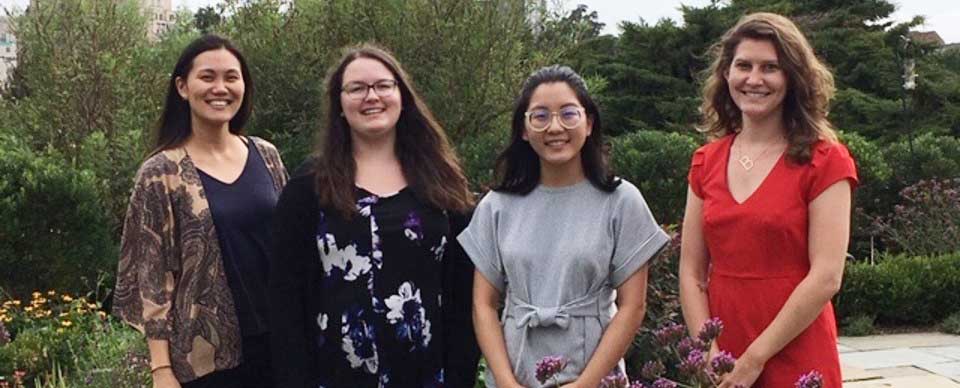National Library of Medicine associate fellows’ research makes biomedical journal data FAIR
Meet Louise To, Eden Kinzel, Sharon Han and Brenna Cox
From September 2019 until August 2020 within the National Institutes of Health’s (NIH) National Library of Medicine (NLM) Associate Fellowship Research Participation Program, Louise To, Eden Kinzel, Sharon Han and Brenna Cox collaborated on a project analyzing supplementary materials that are deposited alongside research articles available in PubMed Central (PMC), a free full-text archive created by the NLM which contains the world’s largest database of biomedical and life sciences literature.

(L-R) Louise To, Eden Kinzel, Sharon Han and Brenna Cox, collected and analyzed PubMed Central articles to identify current practices and opportunities in supplementary information and data sharing in biomedical journals throughout their involvement with the National Library of Medicine’s Associate Fellowship Research Participation Program. (Credit: Kathel Dunn/NLM)
The main objective of their NLM group research project was to improve PMC’s guidelines for making data FAIR, an acronym standing for findable, accessible, interoperable and reusable. “Making data FAIR will enable more research and therefore, advancements in science, benefitting us all,” To said.
The NIH NLM Associate Fellowship Program is designed to provide a broad foundation in health sciences information services, and to prepare librarians for future leadership roles at health sciences libraries and in health services research.
For To, Kinzel, Han and Cox, health sciences librarianship is both a passion and a fulfillment of their lifelong collective ambitions. Hailing from varied hometowns that range from Hawaii and Canada to the mainland United States, each of the fellows graduated with a master’s in Library and Information Science. To received her degree in 2018 from the University of Hawai’I, while Kinzel, Han and Cox received their degrees in 2019, from Western University in London, Canada; Washington University in St. Louis; and the University of Denver, respectively.
Along the way to graduation, To, Kinzel, Han and Cox each had a unique learning experience that led them to health sciences librarianship as a career.
To became interested in evidence-based practices and Kinzel decided she wanted to facilitate researchers’ abilities to locate, access and understand health information. Han discovered that health science was a great way to engage people about their everyday lives, bodies and health, while Cox wanted to be in a position to help patients in a nontraditional health professional role.
Under the mentorship of Kathel Dunn, associate fellowship program coordinator at NLM, and Kathryn Funk, program manager, PubMed Central, the fellows pooled their collective knowledge in pursuit of their common purpose to enhance PMC’s data accessibility and discovery.
Twenty journals were selected from four common broad subject terms: medicine, biology, neoplasms and genetics. The fellows then analyzed successive sets of journals, allowing them to create, refine and implement a protocol for examining supplementary materials in PMC.
The associate fellows’ analyses of data collected on a subset of these articles helped them to achieve their objective of identifying current practices and opportunities in supplementary information and data sharing in biomedical journals.
“I think our research with NLM, in combination with future research, could help in defining new standards for supplementary material sharing and preservation,” Kinzel said.
Han remarked, “This research aims to better understand current data and research sharing practices among different science fields.”
Their results will inform developing NLM guidelines for journals when submitting authors’ research materials to PMC.
“The purpose of our group project is to help leadership at NLM make decisions about how to encourage scholarly communication best practices around supplementary material,” Cox stated.
Working as a team has been rewarding for the associate fellows, and each has developed skills that have advanced their respective career paths while offering them insights into where their futures may lie in their scientific endeavors.
“My favorite part of the fellowship is the cohort, which not only gives you the opportunity to grow your network, but also serves as a support system,” To said.
“While in the fellowship, I interviewed for a gateway program into federal service and accepted a position in the Office of Engagement and Training, a job that will hopefully convert into full-time federal employment,” she said.
Kinzel observed, “I think we’ve focused a lot on teamwork and reflection and those are two very important skills to have in the workforce.”
“Additionally, the fellowship introduced me to a number of great people and opportunities to develop my leadership and project management skills, which will serve me in my future career in health sciences librarianship,” she said.
Han explained, “Not only have I learned skills that can be useful in any health science library setting in this fellowship, but I have also made invaluable connections with people who work in various subfields, from outreach to medical terminologies.”
“Since most health professionals use NLM resources, I’m excited to leverage the knowledge I’ve gained at NLM later on in my career within a health information setting to help researchers improve their research and connect patrons with high quality information,” she said.
Cox reflected, “I’ve enjoyed the opportunities to connect with senior librarians and go on site visits to other locations to learn more about information service work at various government institutions such as NASA and the National Agricultural Library.”
“I had such a wonderful experience during my fellowship that, like To, I interviewed for the gateway program into federal service with NLM and I accepted a position to work with the MedlinePlus team as a Consumer Health Specialist,” she said.
The NIH NLM program is funded by NIH and administered through the U.S. Department of Energy’s (DOE) Oak Ridge Institute for Science and Education (ORISE). ORISE is managed for DOE by ORAU.

